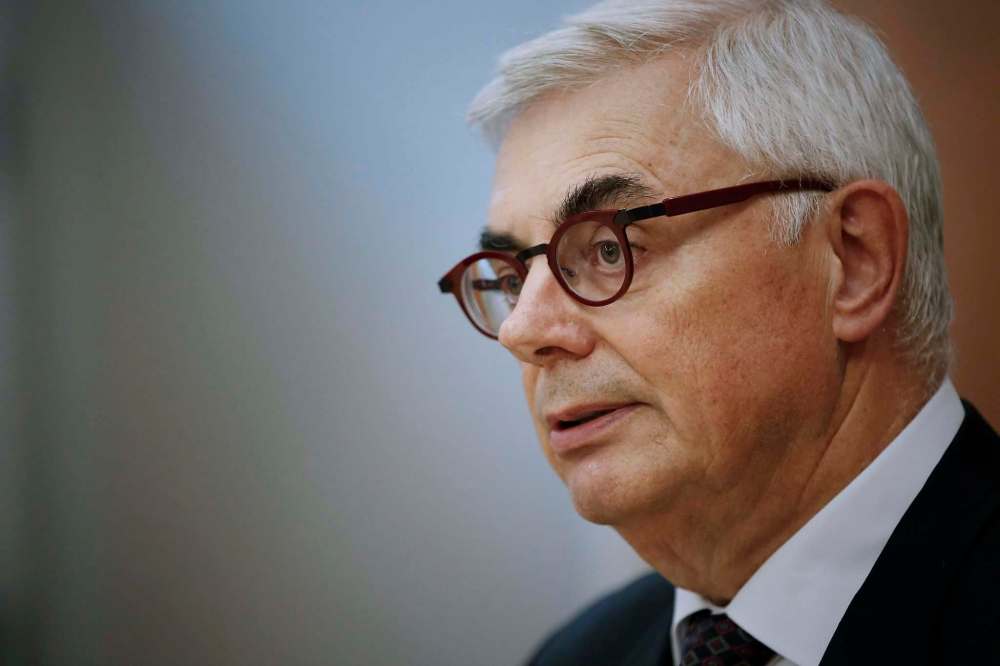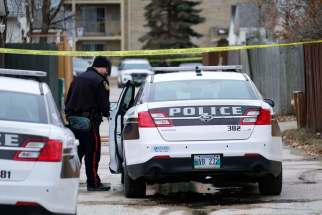Critics fear long-term effects of Pallister order for staffing cuts at post-secondary facilities
Read this article for free:
or
Already have an account? Log in here »
To continue reading, please subscribe:
Monthly Digital Subscription
$0 for the first 4 weeks*
- Enjoy unlimited reading on winnipegfreepress.com
- Read the E-Edition, our digital replica newspaper
- Access News Break, our award-winning app
- Play interactive puzzles
*No charge for 4 weeks then price increases to the regular rate of $19.00 plus GST every four weeks. Offer available to new and qualified returning subscribers only. Cancel any time.
Monthly Digital Subscription
$4.75/week*
- Enjoy unlimited reading on winnipegfreepress.com
- Read the E-Edition, our digital replica newspaper
- Access News Break, our award-winning app
- Play interactive puzzles
*Billed as $19 plus GST every four weeks. Cancel any time.
To continue reading, please subscribe:
Add Free Press access to your Brandon Sun subscription for only an additional
$1 for the first 4 weeks*
*Your next subscription payment will increase by $1.00 and you will be charged $16.99 plus GST for four weeks. After four weeks, your payment will increase to $23.99 plus GST every four weeks.
Read unlimited articles for free today:
or
Already have an account? Log in here »
Hey there, time traveller!
This article was published 20/04/2020 (2058 days ago), so information in it may no longer be current.
Post-secondary institutes are expected to provide plans to reduce staffing expenses as much as 30 per cent Tuesday — one week after being handed a mandate to make sacrifices so Manitoba can weather the pandemic’s financial toll.
Last week, Treasury Board officials asked universities, colleges and government-funded agencies to create workforce-reduction proposals for 10, 20 and 30 per cent cuts. The plans are being drawn up for a period between May 1 and August 31.
“What we’re talking about is an emergency. We’re in the middle of a pandemic. We need to find resources… and I expect everyone to be part of helping find those resources,” Premier Brian Pallister said during Monday’s virtual COVID-19 briefing.
Pallister said public-sector administrators are to provide savings blueprints that reflect the reduced need for services under their authority.

Weeks into the e-learning model, schools have already made staffing adjustments to reflect their empty campuses without in-person instruction and activities. Among the early layoffs, educational assistants, lab demonstrators and recreation staff.
At the same time, schools are anticipating heightened enrolment, as Manitobans who have been laid off try to retool to find work in the inevitable recession to follow the current shutdown.
The University of Winnipeg’s spring enrolment is already up 100 per cent since this time last year.
“We absolutely want to do our part; it’s going to be a challenge though, because we are very much open for business and operating at full capacity,” said Chris Minaker, senior executive officer external at U of W.
University of Manitoba president David Barnard echoed those sentiments Monday.
“It will not be possible to take a decrease of a magnitude without seeing impact,” Barnard said, adding the future impact on U of M is still unclear since the school is finalizing plans.
“We absolutely want to do our part; it’s going to be a challenge though, because we are very much open for business and operating at full capacity.” – Chris Minaker
Neither university provided comment on whether tenured staff could be affected.
When it comes to staffing, agencies are being asked to minimize outright layoffs as much as possible in favour of reduced workweeks, work-sharing and reductions of executive salaries and management positions.
At Brandon University, administrators are also encouraging employees to take unpaid leaves and limit vacations while its cost-saving blueprints are finalized.
The province is asking for more to be done with less, said Jacqueline Romanow, president of the U of W Faculty Association. Romanow, who teaches Indigenous studies, said instructors’ workloads have increased due to e-learning.
While noting Ontario is boosting funding for its publicly funded schools during this time, she said Manitoba’s moves are “disturbing.”
“This is not the time to balance budgets on the backs of institutions which are going to be essential for getting out of this.” – Scott Forbes
Scott Forbes, president of the Manitoba Organization of Faculty Associations, said adjustments required will make U of M “a shell of its former self,” while U of W and Brandon University will no longer be able to offer university-level programming.
“This is not rational, sound planning. It strikes as panic… The notion we could gut our universities at a moment’s notice,” said Forbes, who represents upwards of 2,000 instructors across the province.
“This is not the time to balance budgets on the backs of institutions which are going to be essential for getting out of this.”
Meantime, the student community is feeling “a collective anxiety,” said Brenden Gali, chairman of the Canadian Federation of Students Manitoba.
“This will just directly affect the quality of education,” Gali said.
The premier denied a statement that cuts to schools will be permanent, but the opposition questions how realistic that is.
“I don’t think anyone expects Mr. Pallister to cut a job and then bring it back in the future,” NDP Leader Wab Kinew told the Free Press.
Kinew said slashing post-secondary institutes’ staffing levels is a “foolish” move that will slow Manitoba’s economic recovery; he called on the province to back off from its directives to both universities and other publicly funded entities.
Liberal Leader Dougald Lamont called Pallister’s COVID-19 response plan, “the worst of any government in Canada.”
In a statement, Minister of Economic Development and Training Ralph Eichler cited scenario-planning for the workforce as critical while Manitoba deals with declining revenues and rising health-care expenses.
“Above all, we are working to ensure there continues to be a strong post-secondary education system that can support student success and meet the needs of employers in the future economic recovery period,” Eichler wrote.
maggie.macintosh@freepress.mb.ca
Twitter: @macintoshmaggie

Maggie Macintosh reports on education for the Winnipeg Free Press. Funding for the Free Press education reporter comes from the Government of Canada through the Local Journalism Initiative.
Our newsroom depends on a growing audience of readers to power our journalism. If you are not a paid reader, please consider becoming a subscriber.
Our newsroom depends on its audience of readers to power our journalism. Thank you for your support.







